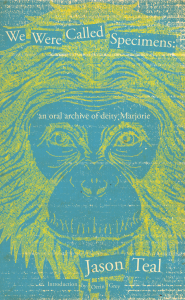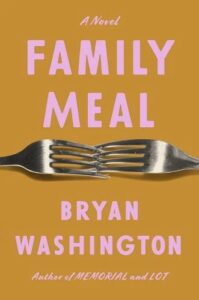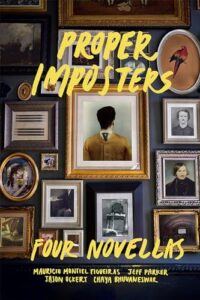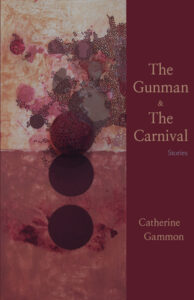Fiction. 156 pgs. Kerpunkt Press. July 2020. ISBN: 978-1-732325-17-3.
In 1922, James Joyce published Ulysses, a tome that is, among other things, known for its wild fluctuations in narrative style to appropriately render the different contexts of a day in the life of Leopald Bloom in Dublin. At first blush, it would be absurd to compare Jason Teal’s We Were Called Specimens to Ulysses if only for sheer length of the respective volumes. Joyce’s novel sprawls to over seven hundred pages in most editions, whereas Teal’s clocks in around one-fifty. However, the DNA of these projects overlaps in deceptive ways. Just as Joyce’s accomplishment made Bloomsday a real world, secular holiday of sorts, Teal invents his own secular deity in Marjorie, a character he explores through such a breadth of lenses to ultimately yield a broader portrait of contemporary American life.
The collection opens on “I Don’t Feel Hungry In This World Anymore,” an overture of sorts rendering the ways in which Marjorie may have been born: in time, in location, in context. The inconsistency of “facts” established therein models the oral history artifice, all about stitching together component pieces to assemble something like a cohesive narrative. Teal also demonstrates his skill at turn of phrase at this stage in the book. “Marjorie is raised by wolves until the wolves die from super parasites,” he writes, only to follow, “Marjorie is raised high into the air, legs a-dangle over a hotel balcony, by her celebrity stepmother.” Herein, language becomes the vehicle for artful transitions, while Teal simultaneously offers snapshots of a larger culture that simultaneously calls nature holy, dreads science, and worships celebrity.
Teal threads an emphasis on fame and media attention through other pieces, including “The Age of Death, An Account.” This oddball piece comes from the perspective of an undead child who knows Marjorie as an aunt, whom Marjorie keeps chained up to exploit for stage performances and a short-lived network game show called Are You Smarter Than a Dead Person? The story complicates our understanding of Marjorie as a figure of reverence. This person closest to her, closest to the hurt she can cause, ultimately finds solace not in her, but in Simon, the buzzard who comes to pick at his carcass who is, at least, more straightforward in his intentions.
Marjorie isn’t the villain of this book, though, or at least she is not consistently portrayed as such. “Marjorie and the Mountain” captures her working a minimum wage job, in a moment of disempowerment resulting from her broken down car. She studies the face of a mountain that looks like a man, though which man she can’t quite put her finger on. The vignette becomes more about the mountain—its seemingly magical formation, its naming process, its emergence as a tourist attraction—before Marjorie reclaims agency for her and the mountain alike in a bold sweeping stroke. Teal writes, “One night, fractured starlight sprinkling into her room around her, she reaches out to touch the cheek of the mountain, but the mountain jumps aside, killing everyone it runs over.” Whether Marjorie moved a mountain, or the mountain was sentient enough to move itself, the author leaves to our interpretation, but in either case we know we are left with a stunning image of something phenomenal and violent.
Teal doesn’t shy away from violence, and that includes tackling it head on, in its most topical form in “Marjorie Saves the School.” In this strikingly short piece—fewer than 150 words—Marjorie takes bullets for children in a science lab. The children play at reenactments, and when shootings carry on the school decides “to arm the children, outfit kindergarteners for flak jackets.” Only in its final sentence does the story return to Marjorie in a poignant moment of questioning whether she were bulletproof.
Pieces like “Dumped by Marjorie” offer a degree of insight into Marjorie less as a symbol or icon than as a human being, but even these instances seem to hold her in a sort of reverence, and show Marjorie keeping the speaker at an arm’s length. The narrator for this piece offers her pearls, caviar, and the means to travel, but Marjorie rebuffs these advances. Teal engenders a sense of a relationship fading with every small rejection en route to the climactic image of Marjorie smothering the speaker.
Relationships aren’t all that’s lost over the course of We Were Called Specimens. “Exceptional Air” flashes to another stage of life, Marjorie arthritic and unstable. She builds a model of New York City, only for the city to overtake the apartment, vast enough to crowd her out and to lose her cat. The piece puts the magic of a model coming to life into conversation with an old woman losing her mind, yielding a sensation of how easy it is, in either case, for one to become utterly displaced.
Joyce’s Ulysses ends on a stream-of-consciousness ramble from the protagonist’s wife that culminates in her recalling when Leopold Bloom proposed marriage, and her enthusiastic consent. It’s unclear if Teal made any conscious homage to Joyce in the structure or delivery, let alone the ending of We Were Called Specimens, but it nonetheless feels altogether fitting that his anatomical exploration of Marjorie should come to a close with “Abscission.” The piece offers its own sense of fluidity and on-going-ness; the longest account of the book, and one that is uncharacteristically untouched by paragraph breaks. Anaphora is the name of the game in the climactic refrain about the inevitability, necessity, and imperative of forgetting.
Teal’s debut book, by contrast, is anything but forgettable. Rather, it is a persistently pensive and experimental collection that challenges convention at every turn. The greatest accomplishment of this book may be its ability to claim space within a literary tradition, while pushing to break new ground and speak to present moment conversations in mass media, conceptions of gender, and much more.
We Were Called Specimens is available through Kerpunkt Press. Purchase it now through their website.
MICHAEL CHIN was born and raised in Utica, New York and currently lives in Las Vegas with his wife and son. He is the author of three full-length short story collections: You Might Forget the Sky was Ever Blue from Duck Lake Books, Circus Folk from Hoot ‘n’ Waddle, and most recently The Long Way Home from Cowboy Jamboree Press. Chin won the 2017-2018 Jean Leiby Chapbook Award from The Florida Review and Bayou Magazine’s 2014 James Knudsen Prize for Fiction. Find him online at miketchin.comand follow him on Twitter @miketchin.
Like what you’re reading?
Get new stories or poetry sent to your inbox. Drop your email below to start >>>
OR grab a print issue
Stories, poems and essays in a beautifully designed magazine you can hold in your hands.
GO TO ISSUESNEW book release
I’ll Tell You a Love Story by Couri Johnson. Order the book of which Tim Jeffries said, “Surprising in their originality, filled with broken wisdom, and with a refreshing use of language and imagery, these are stories to savour and mull over one at a time but which add up to a satisfying whole.”
GET THE BOOK



